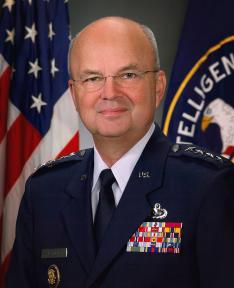American espionage is not only compatible with but essential to democracy, former director of the National Security Agency and the Central Intelligence Agency Michael Hayden told an audience of more than 200 people in Robertson Hall April 6.
“When people are frightened they begin to gnaw on their neighbors’ rights, privacies, and liberties — and when they get really scared, they don’t mind gnawing on their own rights, privacies, and liberties,” Hayden said. “That’s why successful espionage is not just about the defense of American security but about the defense of American liberty.”As director of the NSA from 1999 to 2005 and CIA director from 2006 to 2009, Hayden was at the forefront of many post-9/11 intelligence programs, including targeted killing and the NSA’s Section 215 telephone-metadata program.
“Free peoples have always had to decide where they want to tuck their bed, between security on one side and liberty on the other, privacy over here and safety over here,” Hayden said, in regard to what he sees as an unavoidable tradeoff between the two values.
Asked about the documents released by former NSA contractor Edward Snowden, Hayden said that whistleblowing is good so long as it reveals an illegal activity. But Hayden said the 215 program that Snowden revealed was not illegal but was approved by two presidents and Congress, and was overseen by two congressional intelligence committees as well as a federal court.
Nonetheless, Hayden said, in response to the American public’s increasing distrust of intelligence efforts, federal agencies are attempting to make their activities more “translucent.”
“Translucent means I can see the broad shapes, I can see the outlines of what’s going on, but I don’t have the fine operational details,” he said. “This is a massive adjustment that we’re going to have to make.”
The two biggest challenges that currently confront intelligence work, Hayden said, are working with the president and deciding what information to share with the public. He said it’s often challenging for an intelligence official to compromise with a president, who has his own vision and instincts separate from the facts.
“You’ve got this inherent gap to close, and you do want to close it and get into the mind of the president, but ultimately you can’t become him,” Hayden said.
Although American bureaucracy can often be inefficient, Hayden said, the American system of checks and balances is still one of the most robust in the world.
“We’re all distressed with secrecy and power, and we want to make government more translucent,” he said, “but keep in mind that if we want more invasive oversight and more checks and balances, the line of departure from which we will be leaving is the already most invasive and comprehensive system of checks and balances in the democratic world.”
Hayden also discussed his recently published book, Playing to the Edge: American Intelligence in the Age of Terror, in which he seeks to introduce readers to the inner workings and realities of intelligence agencies.

